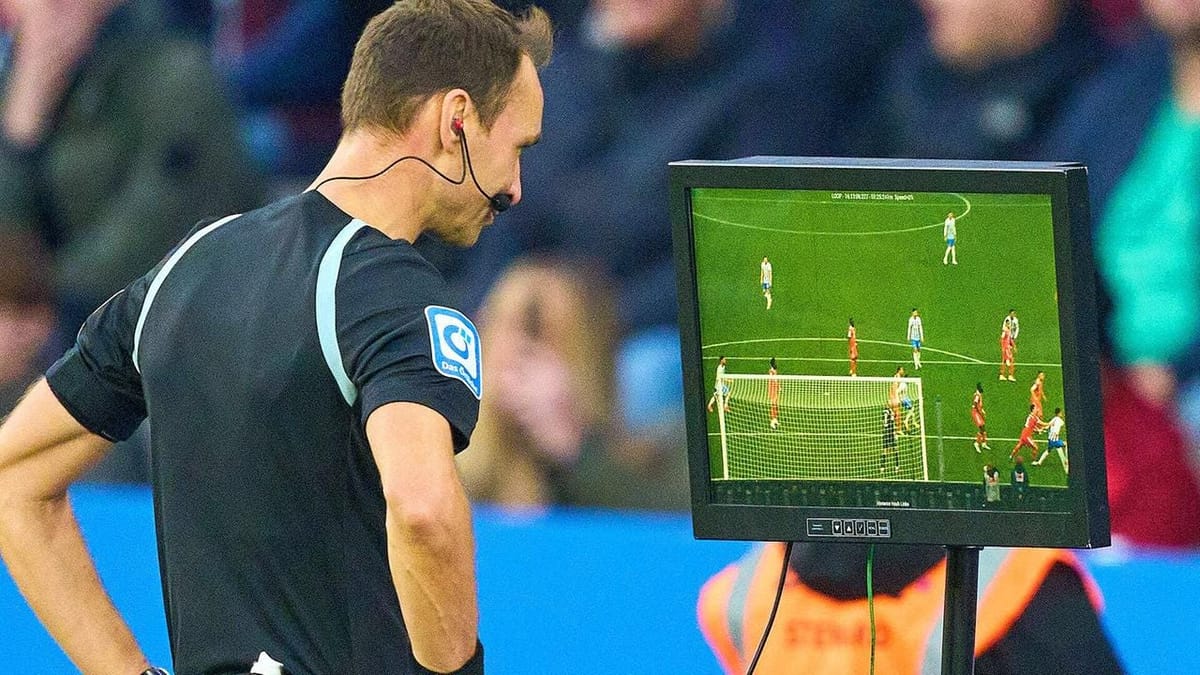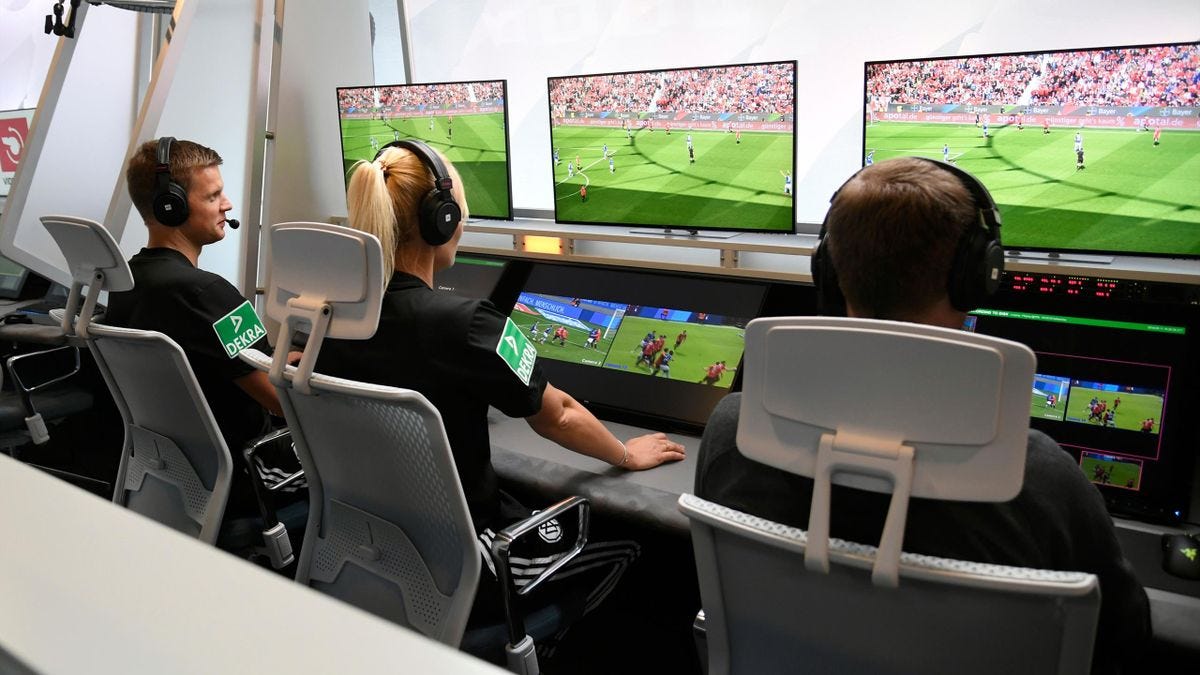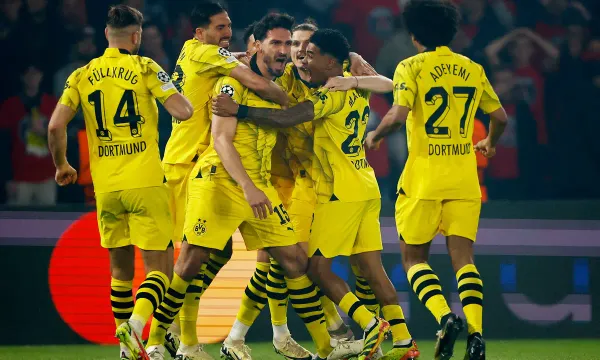Isn't VAR Supposed to be Perfect?
What's the point of VAR if humans will interfere anyway?

In a recent Premier League fixture between Liverpool and Tottenham, a controversial call was made on Luis Diaz’s goal that was denied as he was ruled to be offside after a VAR check. That was a factual error, as Fabrizio Romano explains, mostly due to human interference in the VAR decision. The Premier League has since released the actual audio from the team making the decision, and it shows just how human interference can curtail the effectiveness of VAR.
How VAR is Implemented
VAR, short for Video Assistant Referee, is a system where video footage of the happenings in a football match is used to aid the on-pitch referee in making decisions. In concept, VAR is the ‘eyes and ears’ of the referee beyond what he himself or the linesmen can perceptibly see.
💡 In principle, a VAR is a fifth referee who has access to match footage that is only required to come in on cases of ‘clear obvious error’ or ‘serious missed incident’ for penalty/no penalty and goal/no goal decisions. This post is, however, more about the technology itself rather than the VAR referee.
Despite being a ‘third eye’, VAR itself isn’t the final decision maker and it is upon the referee and other match officials, including the VAR officials/operators to translate what they see from VAR and deduce the necessary action and decision to be made in the game. As it happened in the case of Luis Diaz’s goal, VAR clearly showed that he was NOT offside but the officials went on to rule offside and deny Liverpool the goal.
What Errors Were Made in Liverpool vs. Tottenham
The biggest error that the match officials made in Liverpool vs. Tottenham was to make the decision too fast and without taking enough time to really analyze the footage. In high-stakes games such as Spurs vs. Liverpool in EPL GW 7, tension is often high as is the pressure on the officials to be perfect. At hectic moments such as the VAR check for a possible offside after a goal has been scored, it is very likely that the officials will be brash and not even take enough time to analyze the VAR footage.
As Liverpool coach Jurgen Klopp put it:
“I don’t think there is anything to say about the offside goal, I knew it at half-time. In the first moment I saw [it], it’s clearly not offside but then it's offside, so I try to think they have a better view and at half-time we knew. With normal pictures, [it’s] easy to see now. But [I’m] pretty sure whoever did that, made that decision, didn't do it on purpose. It didn’t take extremely long to come to the conclusion. It’s a bit strange but somebody else has to clarify that. I have nothing else to say about it.”
Read more on EPL GW 7 results and commentary.
Beyond that, there is also human interference in the sense that despite VAR being recognized as an official or referee in a match, it is not left to make the needed decisions by itself. This dependence on a human to translate what it shows adds a layer of redundancy and makes it likely that human errors will occur.
Thank you for reading Mania Inc.. This post is public so feel free to share it.
What’s the Point of VAR if Humans Will Interfere Anyway?
The question is, what is the point of VAR if humans will interfere anyway? Why make VAR an official thing if you cannot also allow it to operate independently to analyze the footage through and through and give a decision? We live in an age of AI and I do not see how it’s not possible to have VAR do the check itself and produce a decision that would be recognized as final.
I do understand that the technology is imperfect and that it relies on humans actually checking the footage and fine-tuning it to give them a clear picture of the occurrences on the pitch. Even so, why not make it an independent technology that requires little to no human intervention? The way I envisage this is to have VAR supported by AI - and there’s enough footage data to train it - and allow it to make decisions on fouls and whatnot, and then have only the on-pitch referee come in to view the footage and either support or decline VAR’s decision.
Isn’t VAR just a Smoke Screen?
The way VAR works currently, is as a system dependent on the VAR operator(s) and official(s) to do the check themselves, even without requiring the on-pitch referee to check initially, and then give a decision. The VAR officials sit in a cube, go through the footage, places lines and whatnot within it to check for offside, or even rolls back the footage and loops it, and if they feel comfortable, give a decision.

The main referee seldom comes in and he’s only called to the side of the pitch to look at the VAR monitor when the VAR officials are unsure of the decision to make. Most times, the VAR officials will just make the decision and advise the referee on the steps to take. These points of human interference are what make VAR feel like it is just a smoke screen as essentially, it is humans who are in the background and behind it, making the decisions.
How AI Could Solve VAR
If VAR technology is to be applied fairly and accurately, then there is the need to automate it via AI and allow it to make decisions, log what led it to that conclusion, and also give the why. This way, if the match officials, including the on-pitch referee and the VAR officials (who should not interfere with the decision-making or be required to input anything) disagree with the tech, then they can go through the logs and see what led to the system’s decision.
We are in an age where VAR shouldn’t be something that is operated by a human but rather, by an artificial intelligence system - that is adequately trained with millions of hours of soccer footage - and empowered to make decisions on its own. It cannot be a ‘video assistant referee’ only in wording but rather it should be given the tools to actually assist the referee independently and without necessitating that someone else make the decision for it.
Read more on other top technology trends in 2023 below.




